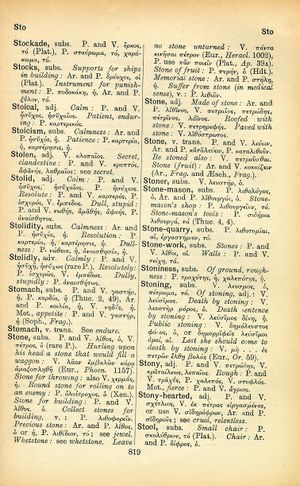stone
Γαμεῖν δὲ μέλλων βλέψον εἰς τοὺς γείτονας → Quaeris maritus esse? Vicinos vide → Auf deine Nachbarn sieh, wenn du an Hochzeit denkst
English > Greek (Woodhouse)
substantive
P. and V. λίθος, ὁ, V. πέτρος, ὁ (rare P.).
hurling upon his head a stone that would fill a waggon: V. λᾶαν ἐμβαλὼν κάρᾳ ἁμαξοπληθῆ (Eur., Phoenissae 1157).
stone for throwing: also V. χερμάς, ἡ;
round stone for rolling on to an enemy: P. ὀλοίτροχος, ὁ (Xen.).
stone for building: P. and V. λίθος, ὁ.
collect stones for building, v.: P. λιθοφορεῖν.
precious stone: Ar. and P. λίθος, ὁ or ἡ, P. λιθίδιον, τό; see jewel.
leave no stone unturned: V. πάντα κινῆσαι πέτρον (Eur., Heraclidae 1002), P. use πᾶν ποιεῖν (Plato, ap. 39A).
stone of fruit: P. πυρήν, ὁ (Herodotus).
memorial stone: Ar. and P. στήλη, ἡ.
suffer from stone (in medical sense), v.: P. λιθιᾶν.
adjective
made of stone: Ar. and P. λίθινος, V. πετραῖος, πετρώδης, πέτρινος, λάινος.
roofed with stone: V. πετρηρεφής.
paved with stone: V. λιθόστρωτος.
verb transitive
P. and V. λεύειν, Ar. and P. καταλεύειν, P. καταλιθοῦν.
be stoned also: V. πετροῦσθαι.
stone (fruit): Ar. and V. κοκκίζειν (Ar., Fragment and Aesch., Fragment).

